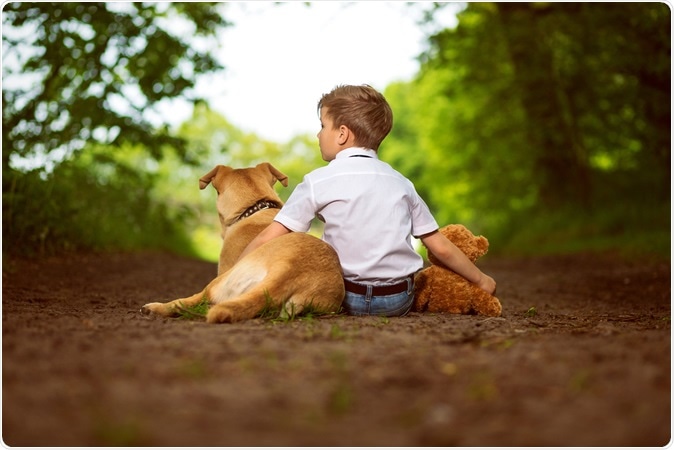In a new study published in the journal Science Advances a connection was found between friendliness of dogs and a particular genetic makeup. Dogs differ from their closest cousins – wolves, in their friendliness towards humans and the gene that makes this possible has now been uncovered. This gene that allows for the hypersocial behaviour in dogs is also common in humans the study finds.

Image Credit: lassedesignen / Shutterstock
Researchers from more than one discipline collaborated on this research question at the Princeton University. They performed genetic sequencing of a 5 megabase length on the chromosome number 6 of the dogs. On looking deeper into the genetic makeup of the dogs, they found that there are several sections in the dog’s DNA that is associated with their social behaviour. Genetic insertions are termed as transposons. These transposons were found in a genetic region of the dogs called the Williams-Beuren syndrome critical region (WBSCR). These transposons when present made the particular dogs friendlier towards humans and made them want physical contact with humans as well as assistance from humans. In humans on the other hand, a deletion or absence of the genes at the counterpart of this WBSCR region of the genetic code leads to Williams-Beuren syndrome. In this condition the person is notably hypersocial and excessively extrovert and outgoing.
According to Bridgett vonHoldt, an assistant professor in ecology and evolutionary biology at Princeton and one of the study’s authors there is a similarity in the behaviours of Williams-Beuren syndrome and the friendly behavioural pattern among pet dogs. This was what led the researchers to check in on the genomic traits and patterns that could connect the two behaviors she explained. VonHoldt had in an earlier study had found that dogs did have a similar gene sequence as the WBSCR. This study was led by Emily Shuldiner who noted the common features between humans and friendly dogs as a part of her thesis work.
The team of researchers looked both at the behaviors of their subjects as well as the genetic sequences before making the correlations. For this study the team led by Monique Udell, an assistant professor of animal and rangeland sciences at Oregon State University looked at the behaviors of 18 pet or domesticated dogs and 10 wolves who have been in captivity for some time and have been exposed to humans. Samples were taken from these dogs and wolves for analysis.
One of the traits that were noted was in an experiment. A puzzle box lid was provided with a sausage as treat under it. There was the animal and the human in the room. The extent of assistance or help that the dog or the wolf sought from the human to get to the sausage was noted. Further behaviors displaying friendliness towards humans they are familiar with and strangers was also noted. These friendly behaviors and seeking of assistance was noted and scored and quantified for assessment. Genetic assessment was made alongside at the laboratories and a correlation was made.
Results of the analysis revealed that the dogs that were domesticated showed more human seeking and human directed behaviors compared to wolves. On analysis transposons insertions were found only among pet dogs and not among wolves confirming the research question. There were structural variants that affected gene parts called GTF2I and GTFIRD1 which led to the typical hypersocial behaviors.
According to VonHoldt there are no “special genes” that make a dog friendly but an important genetic makeup that makes them who they are and form their personality making them tamed from their wild wolf ancestors. She explained that till date it was believed that through evolution dogs became domesticated and those wolves who were sharper at understanding human commands were selected as pets. This can be refuted by this study and it can be said that wolves that had this particular genetic structure probably were friendlier towards humans and got domesticated. They continued to breed and pass on their genetics of friendliness to generations of dogs that became more and more dependent and close to humans.